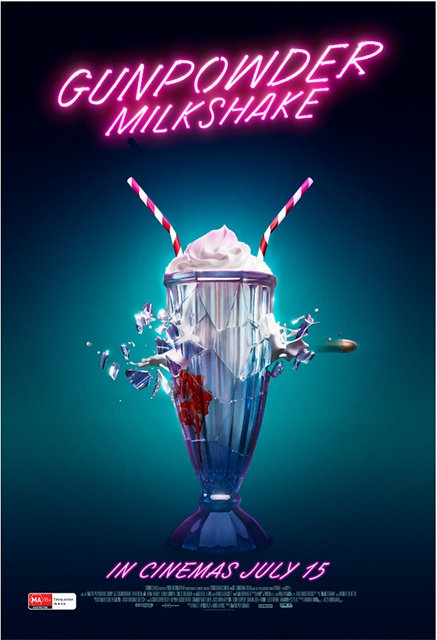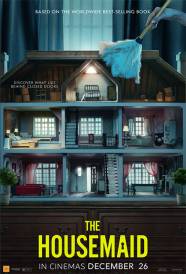Gunpowder Milkshake

Sam (KAREN GILLAN) was only 12 years old when her mother Scarlet (LENA HEADEY), an elite assassin, was forced to abandon her. Sam was raised by The Firm, the ruthless crime syndicate her mother worked for. Now, 15 years later, Sam has followed in her mother's footsteps and grown into a fierce hit-woman. She uses her "talents" to clean up The Firm's most dangerous messes. She's as efficient as she is loyal.
But when a high-risk job goes wrong, Sam must choose between serving The Firm and protecting the life of an innocent 8-year-old girl - Emily (CHLOE COLEMAN). With a target on her back, Sam has only one chance to survive: Reunite with her mother and her lethal associates, The Librarians (MICHELLE YEOH, ANGELA BASSETT and CARLA GUGINO).
These three generations of women must now learn to trust each other, stand up to The Firm and their army of henchmen, and raise hell against those who could take everything from them. In Cinemas July 15
GUNPOWDER MILKSHAKE
In Cinemas July 15
Duration: 114 min
Classification: MA 15+ | Consumer Advice: Strong Action Violence
THE BACKSTORY
Following the award-winning, international breakout hit BIG BAD WOLVES, which he codirected in 2014 with Aharon Keshales, Israeli film-maker Navot Papushado brings a riproaring, female-focused thriller about three generations of hit-women who join forces to conquer a powerful crime syndicate.
For Papushado, the creative process began with one simple idea. "The story started with a mother who discovers that the daughter she was forced to abandon as a child has followed her into the same dangerous profession," he says. "When you start to write, you don't know where you're going to land. The idea comes to life. And I knew I wanted the film to feature librarians because they have always intrigued me. As a kid, I spent almost my entire school life hiding in the library reading sci-fi. Librarians have always fascinated and intimidated me; they're like sheriffs, the original peacekeepers. I thought a library would be the perfect location and alter ego for a group of hired assassins. But it's also a metaphor: a library holds maybe the strongest weapon of all - knowledge. It felt like a perfect fit: a library as an armoury and librarians as hired assassins, with books acting as a metaphor for knowledge and also a place to hide guns."
Papushado went on to create the different worlds of the film. "We wanted to create these two crime syndicates. One is more family oriented and the other one is more corporate, and into this world comes a new generation. So if Scarlet and the librarians symbolize the past and her daughter Sam symbolizes the present which is much more rebellious, then Emily, the young girl Sam has to rescue, is the future. So we had a story about three generations of women and how they fight to gain their place in this world."
The tone of the film is, like his previous films, inspired by the directors he most admires, from Buster Keaton and Charlie Chaplin to Quentin Tarantino and the Coen Brothers via Jean-Pierre Melville, Michael Mann, John Woo, Johnnie To and Jackie Chan. "I mixed violence and humor in Rabies and Big Bad Wolves, and the directors I love always did that," he says. "There's always violence there and there's always comedy. When it's iolence for the sake of violence, it can get a bit nihilistic but when you filter it through comedy and you show the absurdity of it, then it's not about showing the anatomy of violence. Rather, it's about heightened reality, it's about entertainment, it's about how we perceive violence. Most of the violence was written into the script, part of it is through the editing and the soundtrack which really holds it together.
"Because this movie mixes so many different genres and so many ideas, the music was always going to be the glue. It's the same thing that worked for Big Bad Wolves and the same thing that always works for me when I see these genre-blenders," continues Papushado. "When I started talking to composer Frankie (Haim Frank Ilfman), I said I had the Western vibe of Ennio Morricone, the Italian chic of Stelvio Cipriani, and the violent suspense of Bernard Herrmann in mind. The end result is Western mixed with Italian retro chic and the suspense of Bernard Hermann with an electronic vibe that came from Frankie. The soundtrack is retro but modern, it could be played on vinyl or Spotify."
With the script written, Papushado approached producers Andrew Rona and Alex Heineman of The Picture Company in 2018. Says Rona: "I was a big fan of Big Bad Wolves. It was a slick, inexpensively-made movie that came out of nowhere and took the world by surprise that year. The film all took place in one room and although we've seen that kind of environment a million times before, Navot and co-director Aharon Keshales
brought an impressive fresh tone to it and the performances were incredible. It was one of those movies that just blew you away when you saw it."
Rona and Heineman responded immediately to Papushado's new screenplay, which combines action and violence with humour. "It was just fun," says Rona. "I love stylish crime dramas, and GUNPOWDER MILKSHAKE had a voice to it. It's a world that I love. It was clearly written by a film lover and cinephile. The gangster genre is something you see time and time again but this was a fresh take on it. And it was really well-written, it
was pop, it was fun, it was irreverent.
"It had a very good balance of humour and violence," continues Rona. "It reminded me of films of Quentin Tarantino where the humour and the action go hand-in-hand and can't exist without each other and it's almost absurdist."
Rona's producing partner at The Picture Company Alex Heineman concurs: "Navot is a cinephile, he's a great writer and a visionary director. Big Bad Wolves really stood out to us because it's a genre-bending film: it's a thriller but it also has great moments of levity, it has great characters, and it takes very unexpected turns along the way. We knew that Navot is someone who takes genre movies, but spins them in their own way, just like Quentin Tarantino or Edgar Wright, filmmakers work in specific genres but have a unique approach. As soon as Andrew and I read this script, we knew that although he was working in the assassin genre, he was going do his own thing with it, and that's always really exciting."
Papushado's screenplay is a story of lessons learnt and shackles broken: when Sam is forced to choose between saving eight-year-old Emily or abandoning her, Sam is brave enough to do the right thing, unlike her mother, Scarlet, 15 years previously. And it's a story of female mpowerment and the tight bond that develops between Emily, Sam, and Scarlet, the mother who abandoned her, enlivened by unpredictable twists and turns, and populated with a cast of colourful, unforgettable characters. Chief amongst these are the Librarians whose library provides a sanctuary for Sam, Scarlet and Emily.
Says Andrew Rona: "The Librarians, played by Angela Bassett, Michelle Yeoh and Carla Gugino, are not your average librarians: they're a team of also female assassins who are well-armed and well-trained in different fighting styles. They hunker down in the library and this multi generation of women take down the organisation that has been terrorising them for years."
When it came to the style of the film, Papushado had a very clear vision of the look he was after.
"GUNPOWDER MILKSHAKE was initially inspired by the movies of Sergio Leone, Akira Kurosawa, and Alfred Hitchcock," he says. "It is a meeting of these genres, spaghetti western, film noir and Samurai/Ronin movies. For me, the plot ideas and genres always come first, and then the characters come to life into that world."
The director's approach certainly paid dividends. Says Andrew Rona: "Navot is a true cinephile and his film knowledge and understanding of cinema go way back. He's influenced by so many filmmakers, from Akira Kurosawa and Sam Peckinpah to Michael Mann, Martin Scorsese and Jean-Pierre Melville. And he's paying homage to those storytellers, but for a new audience. All those directors found a specific tone for their films.
Tone is everything on a film like this. It's all about characters, it's all about nuances, it's all about little moments, about details. It's about how the characters move and act and interact with each other and I think that's what Navot does really well. He finds that nuance. He finds that tone. The mise-en-scène, as he says, is very important. Navot wants the frame to be special. He's very interested in long takes where the action plays out in the frame. He's not interested in cutting into it. He really wants you to feel like you're there in the moment. This is not a visual effects movie; this is real. It's almost a throwback in a lot of ways. He's very invested in the framing and the choreography of the sequences and the way the actors move within the frame."
With such attention to detail and capturing the aesthetic, it's a tribute to Papushado's personality that the shoot was such a breeze. Says Andrew Rona: "In a movie that was this difficult to make (with multiple locations and complicated stunts), it's really impressive that everyone had a good time and still liked each other at the end of it! I give Navot a lot of credit for that: he put together an incredible cast and crew who really came together. They really enjoyed each other's company and it shows on the screen. These actors really worked hard on the action scenes and came to trust each other completely. They put the hours with the stunt team and it shows."
MORE





